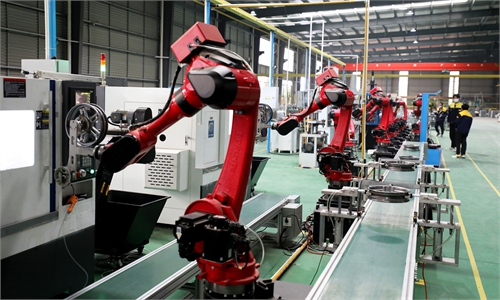
Lujiazui Photo:VCG
The key of China's economic work in the coming years will be maintaining stable growth. In order to reach the goal of achieving all-round modernization by 2035, China should secure average yearly GDP growth rate of 4.6 percent. However, China's economic growth rate could likely slide to below 4.6 percent within three years if due reforms are not carried out. Therefore, striving for long-term stable growth should be the focus of future economic work.
How can economic growth be stabilized? There is a need to return to government's role and market economics. The government should foster continuous growth of the market as well as regulate the market well while performing its functions.
It should be recognized that China's economy remains relatively cold now. Although there was a surge in tourism revenues during the May Day holidays and some rosy data, it cannot be ignored that the current consumer price index (CPI) and the producer price index (PPI) indicates a relatively cold economy.
To heat up the economy, China needs to provide more fiscal help to average consumers. The country should no longer be wedded to the traditional way of boosting infrastructure as there is no longer such ample room for investment in this area. New approaches should be introduced to maintain the confidence of consumers.
For instance, Shanghai recently appropriated 1 billion yuan ($145 million) from local fiscal revenue to subsidize consumers. Preliminary research found that the 1-billion-yuan subsidy can bring additional consumption worth 4 billion yuan, which in turn will create more tax revenues, so in the end, the city's fiscal revenue will rise. The measure can help boost consumers' confidence in the short term.
Second, it may not be as urgent as the need for consumption stimulus, but there should be a restructuring of local finance. After more than a decade of infrastructure construction, local debts have grown to a high level. Excessive local debts are not sustainable. A priority for local governments is debt restructuring.
At the same time, transferring part of the local debt to the central government could also reduce the financing cost and give more space for local governments to focus on maintaining economic and social development.
Third, the government should try to cultivate new markets, including the huge carbon market. Currently, local governments are separately pushing for peak carbon dioxide emissions and achieving carbon neutrality. Nationwide coordination needs to be introduced, which requires a nationwide carbon market. As long as the government adds a little carbon tax in appropriate places, such as crude oil and coal, and gradually increases it, the market will make overall calculations by itself.
If the carbon market can be launched, a good number of green investment projects will become profitable, which will lure more entrepreneurs and investors to the field.
Last but not least, a flexible retirement mechanism should be phased in. It is true that China's population is starting to drop, but considering the quality of the population, the level of education and the level of public health, human resources are increasing which will last until 2050. To make good use of China's human resources, a flexible retirement policy is important.
According to our calculations, if the reform measures are put in place promptly, the potential growth rate of the Chinese economy in the decade from 2020 to 2030 will rise to 5.9 percent.
China's current low inflation shows that the economy has not yet reached its potential growth rate. In the next 10 years, China's potential economic growth rate is expected to reach 4.9 percent if the reforms are successfully implemented. In order for the Chinese economy to maintain long-term growth, the government and the market must work in tandem.
The article was compiled based on a speech made by Li Daokui, director of the Academic Center for Chinese Economic Practice and Thinking at Tsinghua University, at the Tsinghua PBCSF Chief Economists Forum on Saturday. bizopinion@globaltimes.com.cn



